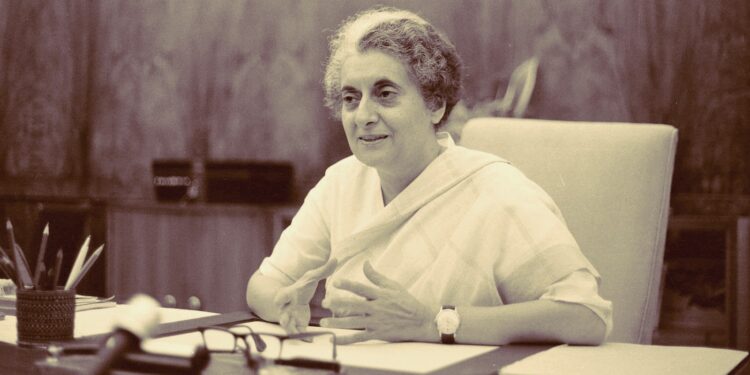Indira Gandhi, a formidable leader and trailblazer in Indian politics, left an indelible mark on the nation’s history. With her unwavering determination, political acumen, and bold leadership, Gandhi became a transformative figure, shaping India’s socio-political landscape. This article delves into the life and achievements of Indira Gandhi, highlighting her impact on Indian politics, her lasting legacy, and the challenges she faced along the way.
Early Life and Political Beginnings
Indira Priyadarshini Gandhi was born on November 19, 1917, into a politically influential family. Her father, Jawaharlal Nehru, was a prominent leader in the Indian independence movement and went on to become the first Prime Minister of India. Growing up in this environment, Gandhi developed a deep-rooted passion for politics and social justice.
Gandhi’s political journey began in the early 1950s when she joined the Indian National Congress, the party at the forefront of India’s struggle for independence. Over time, she gained experience working with grassroots organizations and emerged as a powerful voice for the underprivileged and marginalized.
Leadership and Prime Ministership
In 1966, following the untimely demise of Prime Minister Lal Bahadur Shastri, Indira Gandhi assumed the role of the Prime Minister of India. As the first woman to hold this prestigious position, she faced immense scrutiny and skepticism. However, Gandhi’s strong leadership skills and ability to connect with the masses quickly silenced her critics.
During her tenure as Prime Minister, Gandhi implemented significant social and economic reforms. She initiated the nationalization of banks, aimed at reducing economic disparities and providing financial access to rural areas. Additionally, her focus on agriculture led to the “Green Revolution,” which significantly increased agricultural production, making India self-sufficient in food production.
Emergency Era and Challenges
One of the most controversial periods of Indira Gandhi’s political career was the declaration of a state of emergency from 1975 to 1977. During this time, civil liberties were curtailed, opposition leaders were jailed, and press freedom was severely restricted. The emergency era attracted criticism both domestically and internationally.
However, Indira Gandhi’s tenure also witnessed significant achievements. She played a vital role in the formation of Bangladesh in 1971, helping liberate East Pakistan from oppressive rule and establish the independent nation of Bangladesh. This military victory added to her popularity and cemented her image as a strong leader.
Assassination and Legacy
Tragically, Indira Gandhi’s remarkable journey was cut short on October 31, 1984, when she was assassinated by her own bodyguards in a horrifying act of violence. Her untimely death sent shockwaves throughout the nation and the world, leaving a void in Indian politics.
Despite the controversies surrounding her, Indira Gandhi’s legacy remains influential. Her contributions to Indian politics, including her focus on welfare programs, women’s empowerment, and her unwavering commitment to the unity and integrity of the nation, continue to inspire generations. Gandhi’s ability to connect with the masses, her strong leadership during times of crisis, and her dedication to social justice have solidified her place in India’s political history.
Indira Gandhi, a trailblazer in Indian politics, left an indelible mark on the nation’s history. Her leadership, political acumen, and commitment to social justice continue to resonate. While her tenure was not without controversy, Gandhi’s contributions in areas such as economic reforms, agriculture, and international relations are noteworthy. As India continues to evolve, the impact of Indira Gandhi’s transformative efforts cannot be overlooked. Her legacy serves as a reminder of the importance of strong leadership, resilience in the face of challenges, and the pursuit of social progress.
Today, as we reflect on Indira Gandhi’s remarkable journey, it is essential to acknowledge the complexities and nuances of her political career. Her decisions during the Emergency era sparked debate and criticism, highlighting the delicate balance between maintaining stability and upholding civil liberties. However, it is crucial to view her tenure in its entirety, considering both the achievements and the challenges she faced.
Indira Gandhi’s impact extended far beyond her time in office. Her indomitable spirit and unwavering commitment to social welfare programs transformed the lives of millions of Indians. Initiatives such as the Garibi Hatao (Eradicate Poverty) campaign aimed to uplift marginalized communities and bridge socioeconomic gaps. Moreover, her emphasis on women’s empowerment laid the foundation for gender equality, inspiring subsequent generations of Indian women to enter politics and other spheres of influence.
Gandhi’s international diplomacy was instrumental in shaping India’s global standing. Her leadership during the formation of Bangladesh solidified India’s position as a regional power committed to supporting the aspirations of neighboring nations. Additionally, her strong advocacy for non-alignment in international relations further emphasized India’s independent foreign policy stance.
The tragic end to Indira Gandhi’s life was a stark reminder of the risks faced by leaders in the pursuit of progress and the complexities of democracy. Her assassination sent shockwaves throughout the nation, prompting introspection and a reevaluation of the path forward. In the aftermath of her death, her son Rajiv Gandhi took the reins of leadership, ensuring the continuity of the Nehru-Gandhi political legacy.
Indira Gandhi’s legacy continues to shape Indian politics. Her perseverance in the face of adversity, her ability to connect with the masses, and her unwavering commitment to the welfare of the nation remain a source of inspiration. Her political journey serves as a testament to the enduring spirit of Indian democracy and the transformative power of leadership.
In conclusion, Indira Gandhi’s presence in Indian politics was marked by a formidable determination to uplift the nation and champion the cause of social justice. Her achievements, though accompanied by controversy, left an indelible imprint on India’s political landscape. As India continues to navigate the complexities of a changing world, the legacy of Indira Gandhi serves as a constant reminder of the power of leadership, the pursuit of progress, and the enduring spirit of democracy.
newshub




Recent Comments